Newsletter


Our Newsletter
Connections
Feb
6
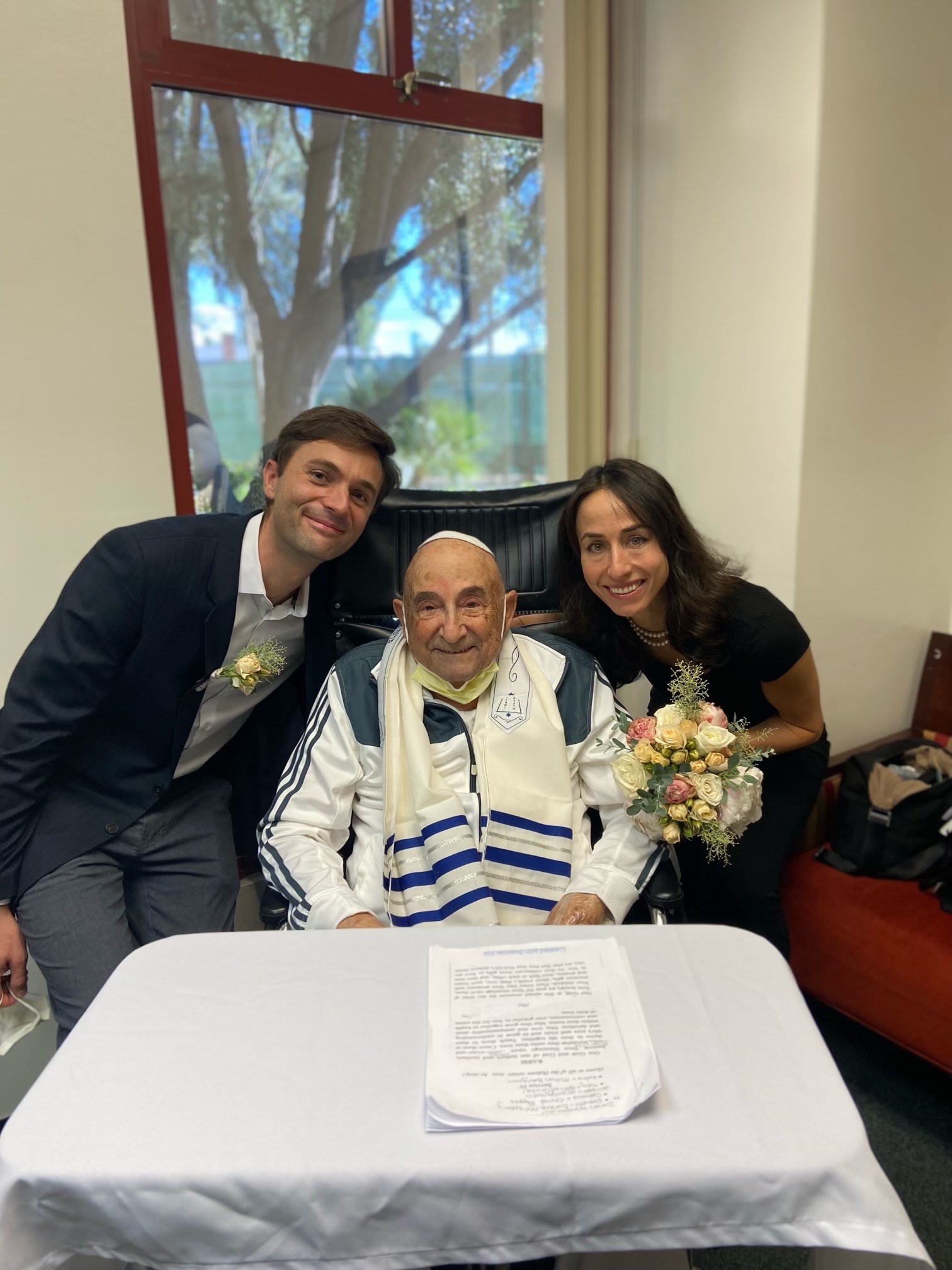
At Los Angeles Jewish Health Love Knows No Bounds
When 94-year-old Jack Schlaifer agreed to officiate at the wedding of his grandniece, Alison, and her fiancé, Daniel, he was building on a family tradition: months earlier, he had performed the marriage ceremony for Alison’s father (his nephew Charles) in the backyard of his Westlake Village home. Jack was honored when Alison asked him to do the honors for her wedding as well. They laid out plans for a similar ceremony, in the same venue, on New Year’s Day—until life got in the way.
“In November, I had a fall, and I fractured my L5 [a region between the lumbar and sacral spine in the lower back],” Jack says. “Suddenly, I was living in a rehabilitation facility, and all bets were off. I called Alison and told her, ‘You can’t count on me for the wedding.’ I was sad about it, but what could I do?”
Alison knew exactly what he should do: proceed full steam ahead. "She said, “Uncle Jack, I don’t care where you are; I want you to marry us. We’ll come to wherever you are!’” he recalls. “I was incredibly moved.”
All that was left was to coordinate with the staff at Los Angeles Jewish Health. LAJH is a place that Jack, a native Angeleno who had raised his family in the Valley, had long known and loved. “I joined The Guardians (a support group of LAJH) in 1980, and when they formed The Executives, I was a founding member and, later, president,” he said. “I served on The Executives’ board for 30 years.”
Jack reached out to Los Angeles Jewish Health staff, and everyone enthusiastically leaned in to ensure all details were arranged. On January 1, 2024, in a cozy family room on the Grancell Village campus, Jack gathered together with Alison, Daniel, and an intimate group of family to give the couple his blessing and pronounce them “man and wife.”
“It was an amazing wedding, and it brought me a lot of naches [joy],” Jack says, smiling. “After it was over, the family went for sandwiches to Brent’s Deli, which is Alison and Daniel’s favorite place. It was perfect.”
Once the ceremony was complete, it was back to the hard work of rehab. Every day Jack has both physical and occupational therapy, and every day he gets a little bit stronger. While the road to recovery is long, he is grateful to be walking it at Los Angeles Jewish Health.
“I’m lucky to be here,” he says. “The care is wonderful, and the people are great.”
Feb
6
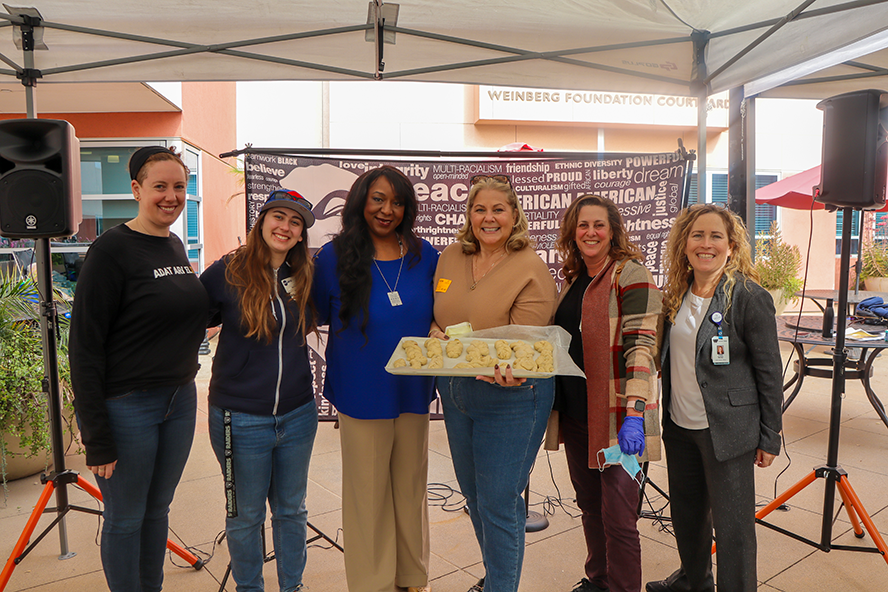
Special Intergenerational Program Honors Martin Luther King, Jr. and the Spirit of Coming Together for the Greater Good
Members of the Jewish and African-American communities have long found solidarity in common purpose, with a history of teaming up toward the pursuit of equal rights. As the New Year began, two diverse community groups gathered at Los Angeles Jewish Health to remember the legacy of the late Rev. Dr. Martin Luther King, Jr. while continuing to build toward a unified future. They literally came together to break bread.
In collaboration with Challah and Soul, a program that seeks to educate and unite the Jewish and Black communities, high school students from Adat Ari El congregation traveled to Los Angeles Jewish Health for an adventure in baking and storytelling. During the fascinating intergenerational event, LA Jewish Health residents shared memories of Dr. King as they worked side-by-side with the students to braid loaves of challah. The result: a wonderful afternoon of raising awareness, passing along a beloved Jewish tradition, and fostering strong intergenerational bonds.
“The students arrived with smiles and great energy,” says Susan Leitch, community manager and safety officer at Los Angeles Jewish Health and a key organizer of the event. “It was wonderful to see them interact with our seniors.”
Created by Shonda Isom Walkowitz, the founder of Bucks Happy Farm in the Lucerne Valley, and Judi Leib, a chef and veteran of the food services industry, Challah and Soul was built on a mutual interest in helping Blacks and Jews rediscover the things that make them natural allies. As challah dough was passed to the assembled residents and students, Judi spoke about the importance of food in uniting diverse people, and Shonda offered her thoughts about the similarities between the Black and Jewish experiences.
“This event showcased how much wisdom and perspective LA Jewish Health seniors can offer to the broader community,” Julie Lockman-Gold, special projects coordinator at Los Angeles Jewish Health, says. “Especially during a time of rising anti-Semitism, our residents have a lot to say about inequality, injustice, and racism. Giving them an opportunity to be heard – and for students to learn from their experiences – was truly meaningful.”
The event drew a large turnout of residents from Grancell Village’s Mark Taper Building and Joyce Eisenberg-Keefer Medical Center, as well as 20 Adat Eri El students and some of their family members.
“Watching them partner to make the challah, you could see the joy on everyone’s faces,” Julie recalls. “When the bread was done baking, the smell was amazing, and people were so excited to dig in!”
By the end of the afternoon, the happiness and contentment that filled the room were clear indications of the event’s success. It was a feeling shared by all participants. Julie added, “As the students were leaving, Adat Ari El’s program director, Sara Markus, told me she’s already thinking about doing it again next year!”
Jan
3
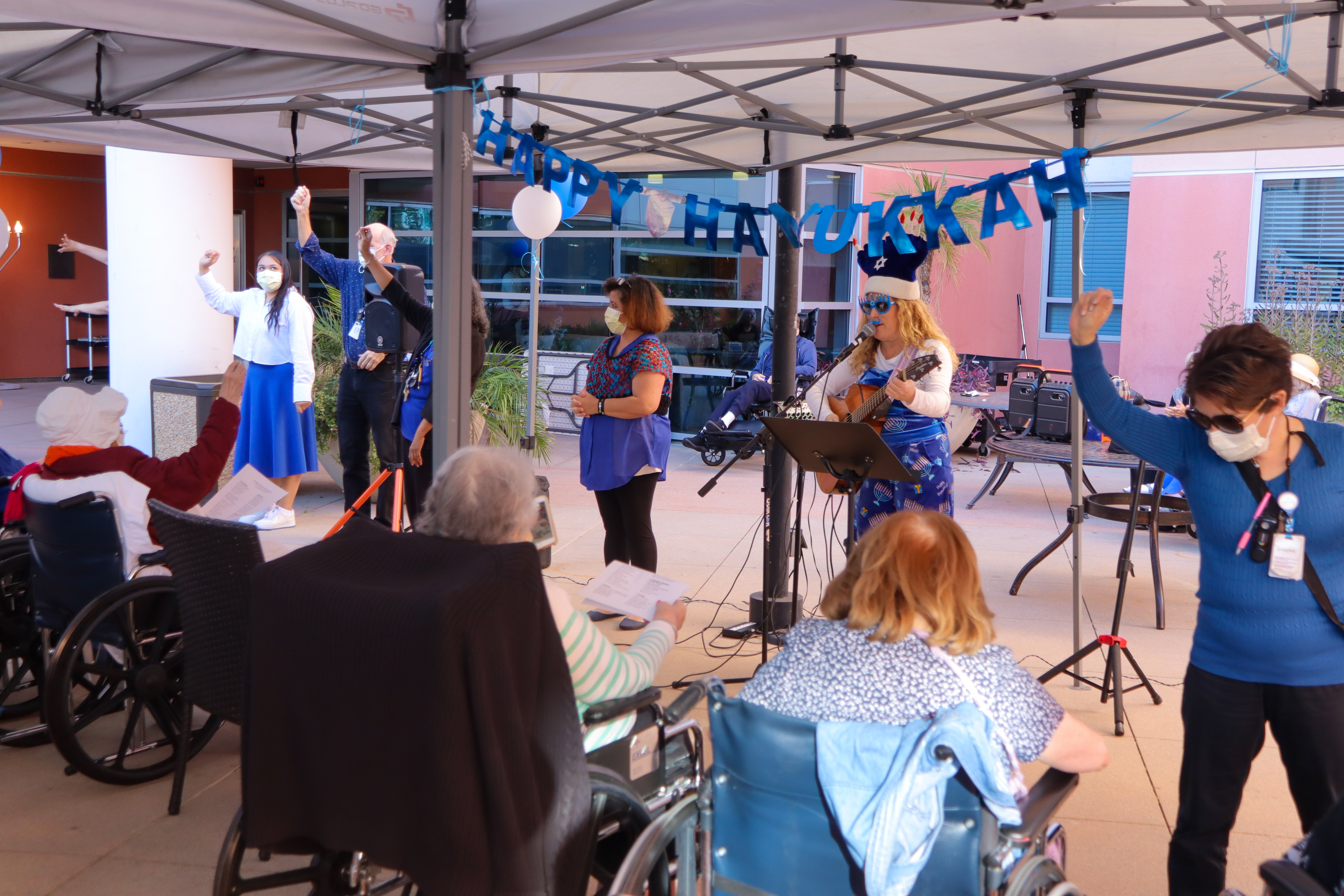
Chanukah at Los Angeles Jewish Health Shined Brighter Than Ever This Year
By Rabbi Karen Bender, Chief Mission Officer at Los Angeles Jewish Health
When I arrived at Los Angeles Jewish Health almost a decade ago and Chanukah was soon approaching, I set out to purchase the largest Chanukah menorah that I could find. I decided this holiday should feel like an extravaganza. There would be joy, surprise, celebration, laughter, and of course, the spectacular and inspiring lights of the largest Chanukah menorah around. Our residents deserved the best.
This year, with the struggles of our brethren in Israel, and even rising antisemitism here in the United States, would we do anything differently? Yes, we would rejoice with even more depth and joy and enthusiasm. After all, like Israel’s courageous soldiers who are fighting on the front lines of the Jewish People today, the Maccabees fought for our right to practice and celebrate Judaism. We honor the courage of both by being brave enough to rejoice. Indeed, our residents deserve it.
The first Prime Minister of Israel, David Ben Gurion, once said, “In Israel in order to be a realist, you must believe in miracles.” As our brothers and sisters in Israel still struggle to bring the light, we brought the miracle of joy and hope to our residents this past Chanukah like never before. After all, the primary theme of Chanukah is the unwavering faith in miracles, as the second blessing of the holiday says, “she-asah nisim l’avoteinu” thanking G-d for the miracles made for our ancestors at this season in those days.
Here at Los Angeles Jewish Health, we of course provide tradition with the intent of stimulating wonderful memories. It is our fervent belief, as well, that extraordinary memories can and are made here. Perhaps the most exciting Chanukah of a person’s life has not yet happened but will happen soon and will happen here.
This year our residents enjoyed a concert with a prominent and highly esteemed local musician, Cindy Paley and a Klezmer group performed traditional folk music. There was traditional singing throughout the holiday. In addition, groups of children from various organizations came to enhance the holiday for all of our residents. The residents also participated in an olive oil and balsamic tasting while learning about Chanukah on a serious adult level. They received new colorful dreidels and chocolate gelt coins. They enjoyed not only potato latkas but also latkas of various vegetable influences, thanks to our creative dietary department leadership. They enjoyed Chanukah cookies and not only regular sufganiyot but also kosher Krispy Kreme jelly donuts. They lit lights and sang blessings as a large community, grateful, each of them, to not be alone these eight nights but on the contrary, to be surrounded by a loving community of peers and caring staff.
They laughed in delight when I showed up dressed as a dreidel one day, as a menorah another, wearing a head to toe Chanukah outfit the next and Chanukah glasses another.
Rabbi Ron Goldberg at the Eisenberg Village Campus describes how the eyes of the residents in our memory care unit lit up as they remembered the words of songs and sang along. He describes gathering everyone around the beautiful outdoor chanukiah, the Chanukah menorah, where together they could safely light real fire, like our ancestors.
Our ancestral rabbis were well aware that Chanukah takes place near the winter solstice during the darkest days of the year and they set out to pierce the darkness and illuminate their world. The metaphor was not lost on them nor is it on us, especially this year, that we can all be a light in the darkness. Nothing brings more light than the smiles on the faces of the precious seniors we serve.
Ben Gurion had another famous saying: “Anyone who believes you can’t change history has never tried to write his memoirs.” For all of you out there who choose to support the sacred work of Los Angeles Jewish Health with your time and resources, please know that you are changing history by enhancing the history and lives of our remarkable residents, participants and patients. Know that if you were to ever write a memoir about your own life you can proudly include the indisputable fact that you have generously enhanced the lives of the elderly in your generation.
For more pictures of Chanukah 2023 at Los Angeles Jewish Health CLICK HERE
For more pictures of Chanukah 2023 at Los Angeles Jewish Health CLICK HERE
Jan
3

Los Angeles Jewish Health Earns Accolades for Impact
Each year, U.S. News & World Report publishes its “best of” rankings across multiple categories. Whether it is evaluating colleges, hospitals, or places to live, the renowned media company identifies and recognizes standout performers—and, this year, Los Angeles Jewish Health features prominently on its lists of distinction.
Three Los Angeles Jewish Health facilities—Eisenberg Village (Newman Building), Grancell Village (Taper Building), and the Joyce Eisenberg-Keefer Medical Center received a “Best Nursing Homes of 2024” rating, winning top marks in the area of short-term rehabilitation. In addition, the Joyce Eisenberg-Keefer Medical Center achieved top marks in the long-term care category.
“Los Angeles Jewish Health is extremely proud of this recognition and honored to play a role in improving seniors’ quality of life across our community,” says President and CEO Dale Surowitz. “The ‘best of’ designation feels appropriate because our seniors are truly amazing, and it is our pleasure to ensure they receive the very best of everything.”
The rankings resulted from an assessment of more than 15,000 nursing homes nationwide based on criteria such as patient outcomes, processes of care, and staffing. For short-term rehabilitation, metrics included number of patients able to return home, prevention of falls, and the rate of substantiated complaints. Factors determining results for long-term care were emergency room visits, ability to self-care, and health deficiencies per resident.
The results from U.S. News & World Reports’
rigorous evaluation reaffirm the high level of quality, compassionate care Los Angeles Jewish Health has provided to the community’s seniors for over a century. They are also a testament to the hard work and dedication of LA Jewish Health’s staff, board, and generous donors.
Those diverse stakeholders are critical partners in making Los Angeles Jewish Health’s work—and, by extension, the praise it garners—possible.
“A majority of the seniors we serve rely on some form of government assistance, but that support is not nearly enough to cover the cost of the programs and services we offer to older adults across Los Angeles,” Dale says. “These ‘best of’ rankings are really the result of a partnership with the wonderful people who believe in our mission and invest in our success, and we owe them a true debt of gratitude.”
Dec
6
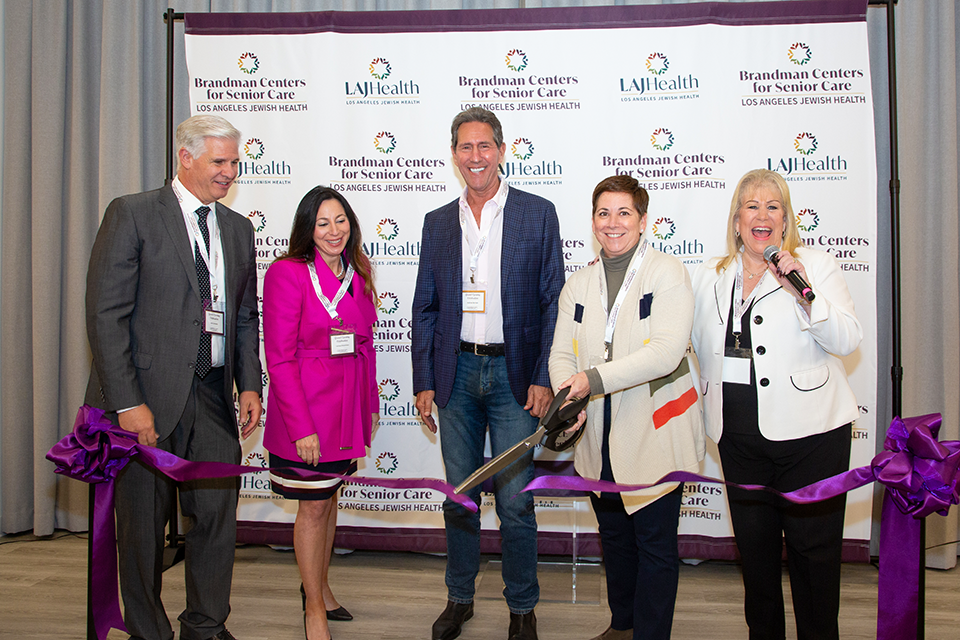
Brandman Centers for Senior Care Gets Ready to Open Its Doors on the Westside
As Angelenos live longer, they are increasingly looking for safe ways to age in the comfort of their own homes. Now, Brandman Centers for Senior Care (BCSC), a Program of All-Inclusive Care for the Elderly (PACE), is making it easier than ever with the opening of its latest facility on L.A.’s Westside. Located on the corner of Pico Boulevard and Roxbury Drive, this new addition to the BCSC family is poised to help nursing home-eligible seniors across the city live richer, fuller, healthier lives.
The center’s official launch was announced on November 15th
at a special open house attended by BCSC donors, care providers, state and national PACE representatives, elected officials, and supporters, who gathered for the opening ceremonies and guided tours of the clinic and other facilities.
“We’ve been working for over three years to make this happen, and I couldn’t be more thrilled that we’re now ready to open our doors,” said Susie Fishenfeld, vice president of the Brandman Centers, in advance of the open house. “We’re excited to meet the full range of healthcare needs for the growing senior community here in Los Angeles.”
The center offers comprehensive services including medical and specialty care, behavioral health services, social work services, physical and occupational therapy services, home care services, prescription medications, and more. In addition, seniors enrolled in BCSC can access a wide array of social activities onsite, where they also receive delicious, nutritious kosher meals.
Grand Opening of the Brandman Centers for Senior Care PACE West Los Angeles Location
Licensed by the State of California and monitored by the California Department of Health Care Services and the Centers for Medicare and Medicaid Services, the Brandman Centers serves seniors aged 55 and older who reside in the BCSC service area and need nursing home-level care, as long as they are able to live in the community without danger to their health or safety. Once they enroll, BCSC works to address all their health-related challenges.
“Perhaps the most amazing thing about BCSC is the coordination of care from our interdisciplinary team,” Susie said. “Seniors and their families or caregivers no longer have to schedule medical appointments, go to the pharmacy, or pay their bills; we take care of everything. Our goal is to make BCSC participants’ healthcare as simple and seamless as possible.”
The first BCSC facility, located in Reseda in the San Fernando Valley, opened in 2013. Today, it serves between 70 and 80 seniors each day, with 340 enrolled in the program. The new center is even larger, with the capacity to serve roughly 150 seniors per day and to enroll between 450 and 500.
The new center also boasts features that are unique to the Westside location, such as a full dental clinic and a lab onsite.
“I’m extremely proud of this facility, which is just gorgeous – and it’s all thanks to the incredible generosity of the Joyce and Saul Brandman Foundation, whose visionary philanthropy made it possible,” Susie said.
Los Angeles Jewish Health President and CEO Dale Surowitz, who delivered remarks at the open house, noted that the Brandman Centers offers a transformational model for innovative senior care.
“Prior to coming to Los Angeles Jewish Health, I served as CEO of Providence Cedars-Sinai Tarzana Medical Center, and one of my jobs was to bring people into the hospital,” he said. “Our goal at BCSC is to keep them out
– empowering them to live independently while receiving the very best healthcare available. This new facility is a gamechanger in West Los Angeles.”
Those who may know of someone who can benefit from participating in the Brandman Centers for Senior Care at either this new location or the original location in Reseda should call (818) 774-8444 or visit BrandmanSeniorCare.org.
Click here to view the photo gallery from the Grand Opening celebration.
Dec
6
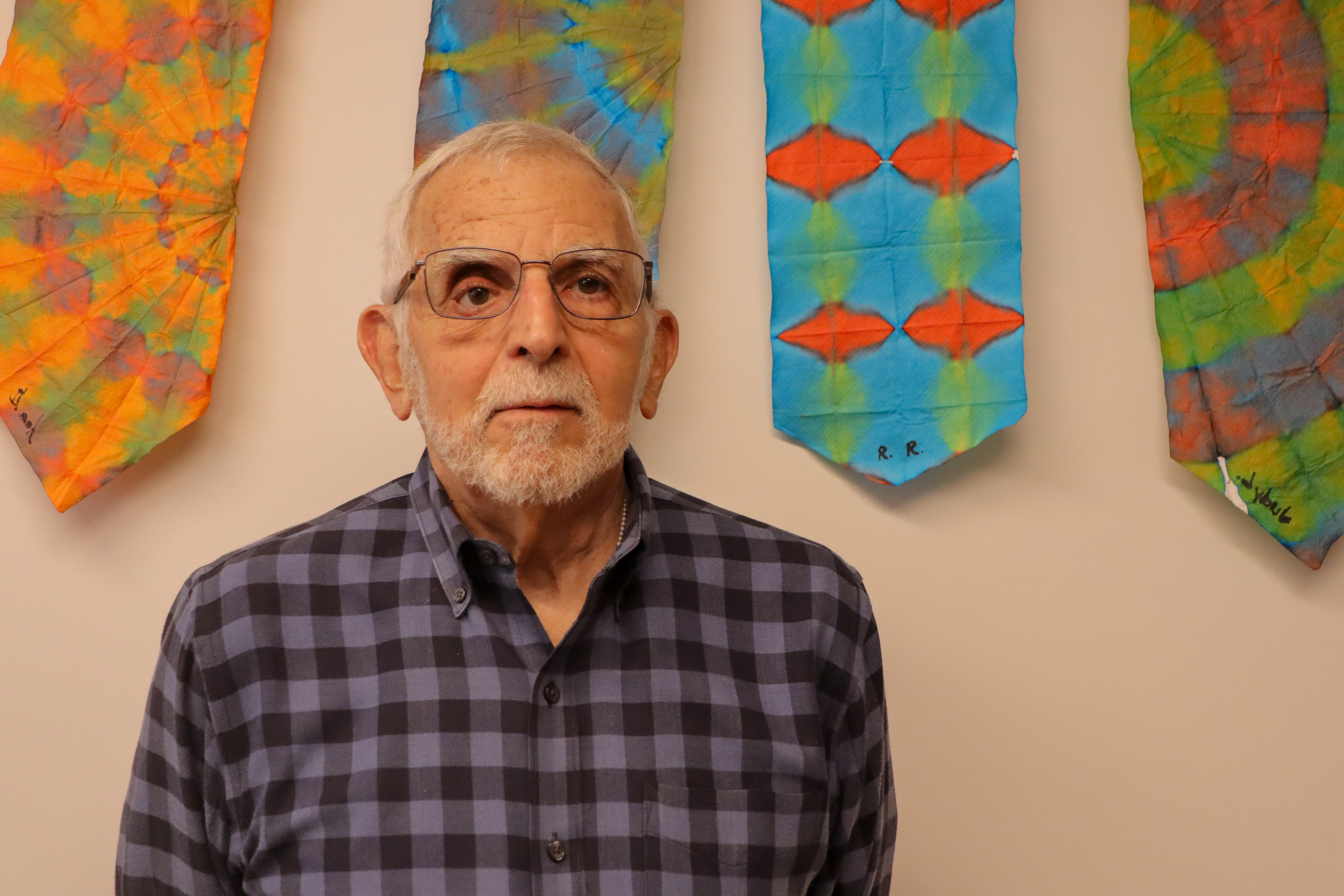
Making Lemonade Out of Lemons at Los Angeles Jewish Health
When long-time San Fernando Valley resident Rick Munitz, 85, took a fall in his backyard, he narrowly avoided serious injury. It was, he recalls, a sign that it was time to make a move.
“I had a Meyer lemon tree that was located on a slope in the yard, and I lost my balance going uphill toward it and took a fall. Fortunately, I landed safely, but it made me realize how lucky I’ve been not to have hurt myself at my age,” Rick says.
The tumble served as a catalyst for Rick to explore alternate living options – a search that ultimately brought him to Fountainview at Eisenberg Village, one of Los Angeles Jewish Health’s premier independent living facilities. He moved in this past July.
“From the moment I walked in here, there was a feeling of belonging,” he recalls. “Fountainview is more than an apartment building; it’s a community.”
Mr. Munitz - a Resident of Fountainview at Eisenberg Village
For Rick, staying in the Valley made sense: It was where he and his late wife, Judy, had built a life for themselves and their family. A native of Milwaukee, Rick moved to Los Angeles with his parents in 1945 and attended Fairfax High School before marrying Judy in 1958, when he was 19 and she was 18. In search of more affordable housing, the couple put down roots in Woodland Hills, raising two kids, Risa and Benjy. Rick also had ties to the Westside – for four decades, he was an English teacher and assistant principal at Beverly Hills High School – but home was on the other side of the hill.
“I knew I wanted to stay local, and Fountainview was the best option for me,” he says. “There’s so much to do, and I’ve been trying it all: playing bingo, joining a men’s group, going to Rabbi Ron’s classes every Thursday, and attending Shabbat services on Friday nights. I’ve met lots of people, and they’re all incredibly welcoming.”
His peers have also provided an important support system during a particularly sensitive time. “My son, Benjy, and his family live in Israel, and I have three Israeli grandchildren who are serving in the army during the war in Gaza,” he says. “Many people here have a connection with Israel, and they have been very nice about expressing concern for me and my loved ones.”
Rick’s daughter, Risa, and her husband live in Westlake Village; she volunteers at Fountainview, teaching a crocheting class every week, which Rick happily attends. “It’s such a joy for me to watch her teach, and to be able to spend time with her and with her two kids – my local grandchildren, who come to Fountainview to visit,” he says.
Although he has only recently taken up residence at Fountainview, Rick was already somewhat familiar with the Eisenberg Village campus – his mother, who had advanced Parkinson’s disease, lived in the [now closed] Max Factor Family Foundation Building until she passed away. “I came to see my mom every week,” he says.
In the months since he moved in, Rick has been refamiliarizing himself with the campus he used to visit. “I go outside and stroll around every day, and it’s wonderful because it’s flat here, so I can walk easily,” he says. “It’s much safer than my old backyard – and, if I want lemons, I can just go to the supermarket!”
_______________
A New Look for Fountainview at Eisenberg Village
At Los Angeles Jewish Health, we have prided ourselves on providing excellence in senior healthcare for more than a century. Our commitment to offering residents the very best includes ensuring they have access to well-appointed, up-to-date facilities. With this in mind, we recently upgraded Fountainview at Eisenberg Village, our premier independent living community in the San Fernando Valley.
With input from Fountainview residents and the support of generous donors, we installed gorgeous new carpet and flooring, painted walls and ceilings, and added modern wallpaper designs. Kudos to our hardworking staff and vendors, who undertook a labor of love in making the renovations. Our residents are thrilled with the results!
Refurbished Lounge at Fountainview at Eisenberg Village
Refurbished Lobby at Fountainview at Eisenberg Village
Refurbished Hallway at Fountainview at Eisenberg Village
Oct
31
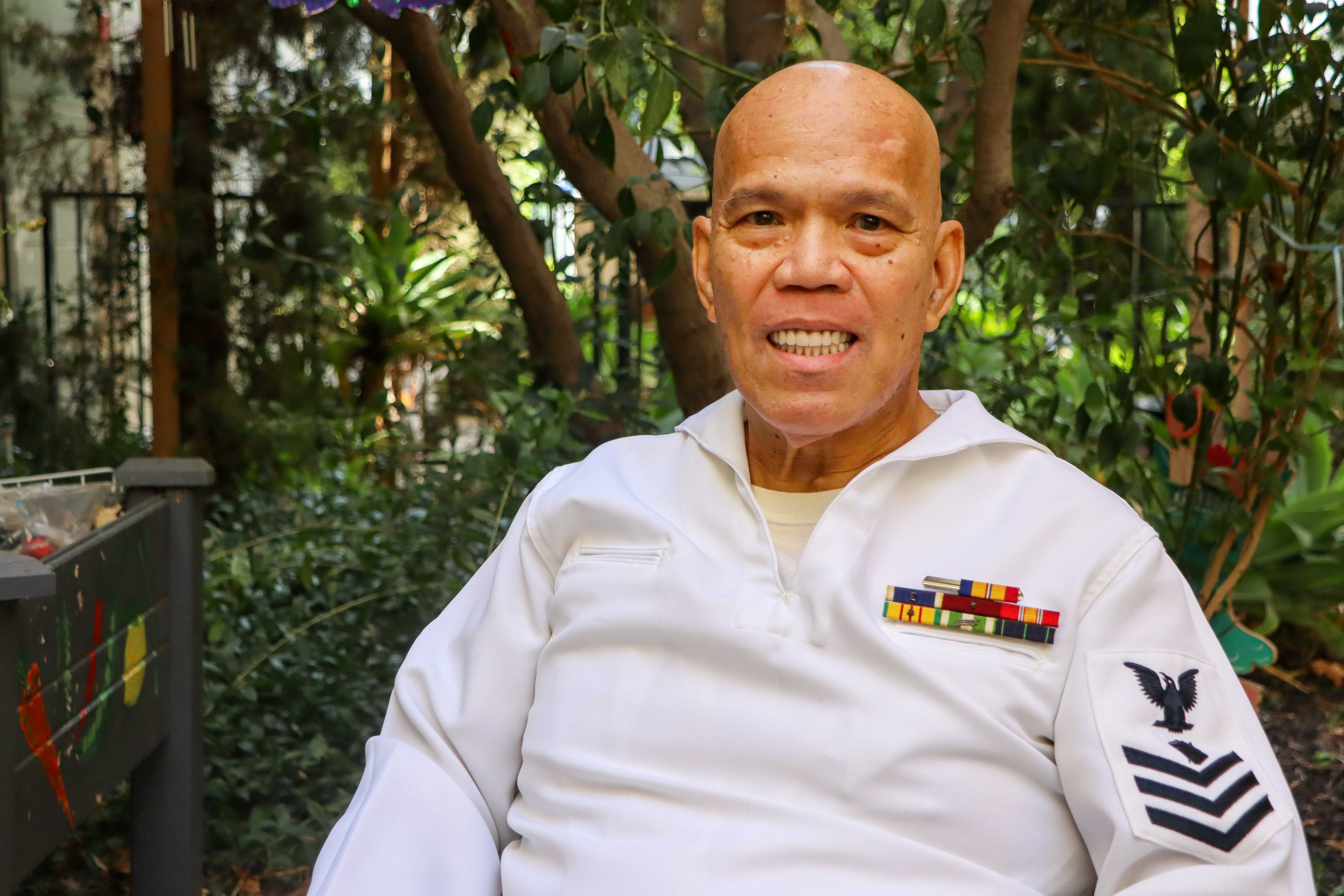
When It Comes to Providing Expert Care for Veterans, Los Angeles Jewish Health Is Proud to Serve
In December 2022, when Navy veteran Ed Vibar, 72, first came to Los Angeles Jewish Health’s Brandman Centers for Senior Care (BCSC), a Program of All-inclusive Care for the Elderly (PACE), he rolled his wheelchair through the doors. Ed had been unable to walk for four years, following an ankle injury. He had begun to lose hope that he would ever recover his mobility and had turned to LA Jewish Health and BCSC PACE as a last resort.
For Ed, the road to Los Angeles Jewish Health had been a winding one. He immigrated to the United States from the Philippines as a young man and enlisted to serve his adopted country, spending 12 years on active duty and another five in the Naval Reserve. He loved his work, which included stints on a guided missile destroyer in Vietnam and a project management position that had him collaborating with the Army Corps of Engineers to oversee a $300 million budget. During the course of his career, Ed was married three times and had four children, bringing him the attendant joys and heartaches that can accompany domestic life.
Ed Vibar
Retirement brought an end to Ed’s health insurance, so when he injured his ankle in his late 60s, he sought care at his local Veteran’s Affairs Hospital. Though imaging showed damage to nerve tissue and tendons, at that time Ed was told the VA lacked the resources to provide appropriate therapy, and doctors informed him he was unlikely to recover the ability to walk. Meanwhile, the longer he remained confined to a wheelchair, the more his health declined, and he began to suffer from gout, high blood pressure, and depression. Being unable to drive made it hard to buy groceries and cook nutritious meals, and eventually, he lost all his teeth.
When he saw a brochure for BCSC PACE, Ed decided to investigate. “I went online and realized BCSC PACE was exactly what I needed,” he recalls. “In addition to offering state-of-the-art physical therapy, they would also coordinate all of my care and provide transportation, which was becoming increasingly difficult for me to access. And the costs were all taken care of thanks to my Medicare and Medi-Cal coverage!”
At BCSC PACE, Ed was paired up with Jensen De La Luna, an expert physical therapist who went to work creating a rigorous treatment plan. “Ed was clearly depressed, and initially, his drive to get better was fairly low. But we dove into therapy twice each week, and his motivation picked up. After three months, he started walking again,” Jensen says.
For Ed, being able to get up and around with a walker was transformational. “Jensen inspired me to try, which really gave me a boost,” he says. “I kept thinking, if I work a little harder, I can travel to see my grandchildren.”
Soon, he was able to stand on his feet to cook, do dishes, and clean up after his dog. “It really changed my life, and I did end up taking the train to Texas, all on my own, to see my grandkids,” he says. “I owe it all to LA Jewish Health’s BCSC PACE program!”
Today, Jensen says Ed’s mobility has increased by more than 50 percent – and his pain has decreased by an equal amount. “I’m so happy for him,” Jensen says. “It’s amazing to see that someone who used to require a wheelchair to come see me can now walk right through the door!”
In addition to physical therapy, Ed also received occupational therapy (to help improve his performance of daily tasks) at the BCSC PACE program – and he had a team of professionals helping meet his other medical issues, as well. “I didn’t have proper teeth, and BCSC PACE got full dentures for me right away. Now, I can eat everything, including a full steak dinner. They were so amazing at anticipating my needs,” he says. “I used to be afraid to smile, but now I want to open my mouth wide and say, ‘Come to the BCSC PACE program and Los Angeles Jewish Health!’ I would recommend it to any veterans, and to all seniors who want to get better healthcare and improve their life situation.”
The Brandman Centers for Senior Care’s PACE program continues to expand to meet the needs of the community. The newest site – on Pico Boulevard, in West Los Angeles – is scheduled to open this November. For more information call (818) 774-8444 or go to BrandmanSeniorCare.org.
Ed Vibar and Physical Therapist Jensen De La Luna
Oct
31
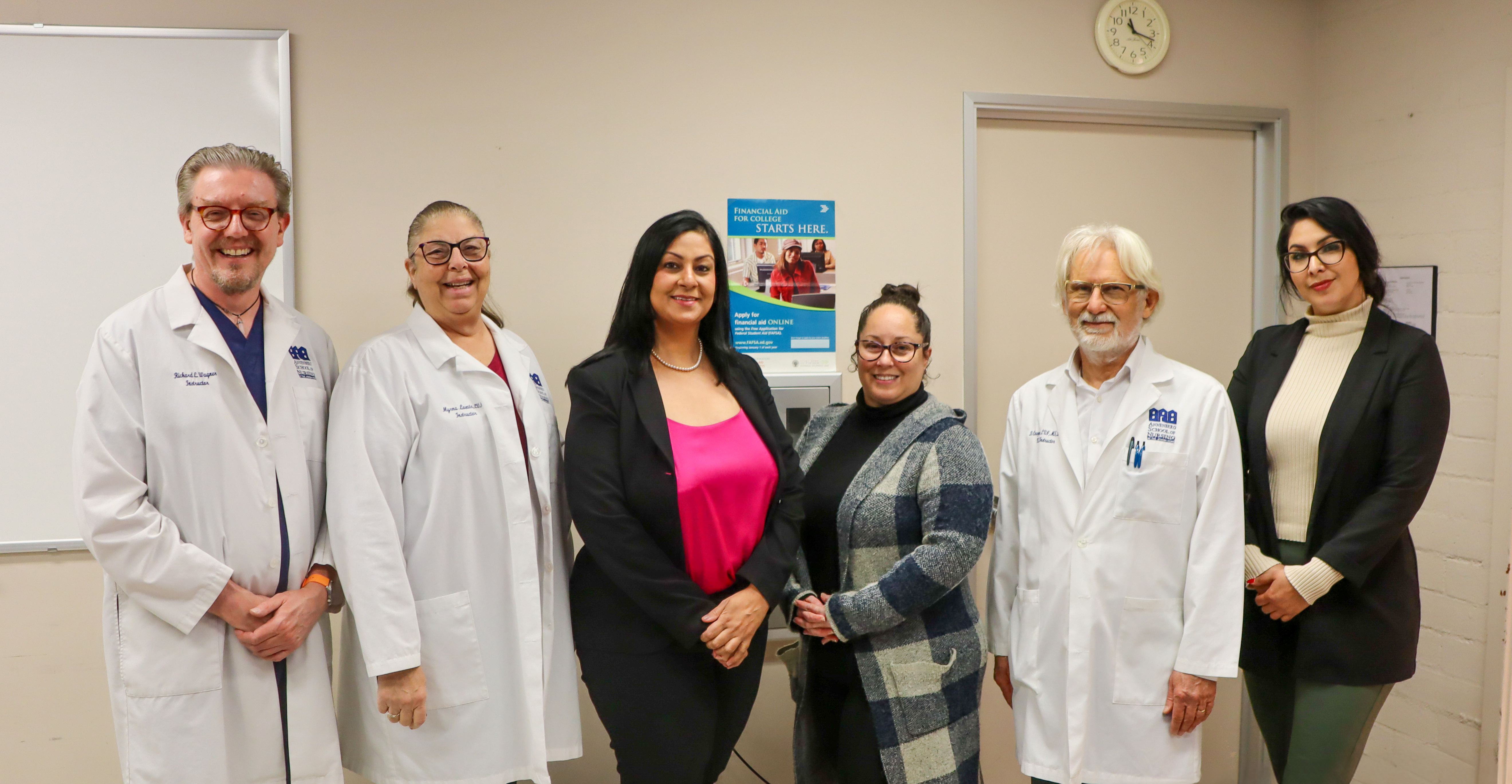
At the Annenberg School of Nursing, on the Campus of Los Angeles Jewish Health, Amandeep Kaur Found Her Calling
When she immigrated to the United States from her native India in 2004, 22-year-old Amandeep Kaur had completed her bachelor’s degree in mass communications and was working on a master’s. She landed in Los Angeles eager to advance herself, but quickly discovered the obstacles that lay ahead.
“I arrived here with $364 in my pocket and realized I would have to choose between going back to school and putting food on the table; I didn’t think I could do both,” she recalls.
Annenberg School of Nursing Staff
Given her limited resources, Amandeep opted to join the workforce, securing a job at Subway as she explored opportunities to climb the ladder of professional success. Fortunately, she didn’t have to wait long: A regular Subway customer mentioned his mother lived at Los Angeles Jewish Health (then known as Los Angeles Jewish Home) and suggested Amandeep consider a nursing program there that would offer her employment while she studied in order to help cover the cost of the education. The next day, she took a bus to Los Angeles Jewish Health to look into this potential opportunity.
“It sounded too good to be true, but I discovered he was right,” Amandeep says. “I couldn’t believe it – I could simultaneously earn income and pursue my education as I built my own American dream! I signed up right away.”
Amandeep never looked back. She started classes at LA Jewish Health in April 2005; four weeks later, the organization officially hired her so she could get vital, hands-on experience as she made progress toward her nursing certificate. “I was incredibly grateful for the chance to develop new skills that could translate to a meaningful career,” she says.
Adjusting to life in a new country and culture was difficult, but Amandeep’s determination and drive pushed her through. “There were times when I felt defeated and wanted to go back to India. The challenge of making a living here felt too big, and I worried I couldn’t do it,” she says. “But this is a land of opportunity, and it pushes you. I believe we all have the capacity to succeed; it just depends on how we use it.”
Amandeep embraced the challenge, expertly juggling academics, work, and the responsibilities of starting a family. “Thanks to LA Jewish Health, I was able to work full-time while earning my nursing credentials,” she says – credentials that ultimately grew to include CNA (certified nursing assistant), LVN (licensed vocational nurse), RN (registered nurse), and PHN (public health nurse) certifications, as well as both Bachelor of Science in Nursing (BSN) and Master of Science in Nursing (MSN-Ed) degrees.
“During my LVN program, we were allowed to take three days off, plus the weekend; during that time, I flew to India, got married, and came back – all in just five days! To be honest, I’m not sure how I managed it,” she laughs.
In 2012, Amandeep left LA Jewish Health for a little while. She then returned in 2015 as an RN supervisor in the Joyce Eisenberg-Keefer (JEK) Medical Center. After three years, her professional excellence and her dedication to LA Jewish Health were recognized with her promotion to assistant director of Annenberg; just four months later, she was promoted again – this time, to director.
Today, Amandeep is thrilled to be at Annenberg’s helm, steering the school’s direction and being a part of the community she loves.
“LA Jewish Health is a family. When I walk into a building to make rounds, I run into so many friends – people who want to catch up or are looking for advice. I feel so at home here,” she says.
She also feels proud to be in a position to help nurture a new generation of nurses. “LA Jewish Health took a chance on me, and now it’s my turn to be able to invest in other people,” she says. “I wouldn’t be who I am today if it weren’t for LA Jewish Health. I’m so privileged to be able to pay that forward.”
The Annenberg School of Nursing has been ranked in the top three LVN schools in the entire state of California. Practicalnursing.org ranks nursing schools based upon their first- time successful pass rates for the state licensing exam, overall student support services and program elements more easily streamlining students towards achieving licensure. To learn more call 818-757-4431 or visit ASN.edu
Amandeep Kaur and Annenberg School of Nursing Students
Oct
3
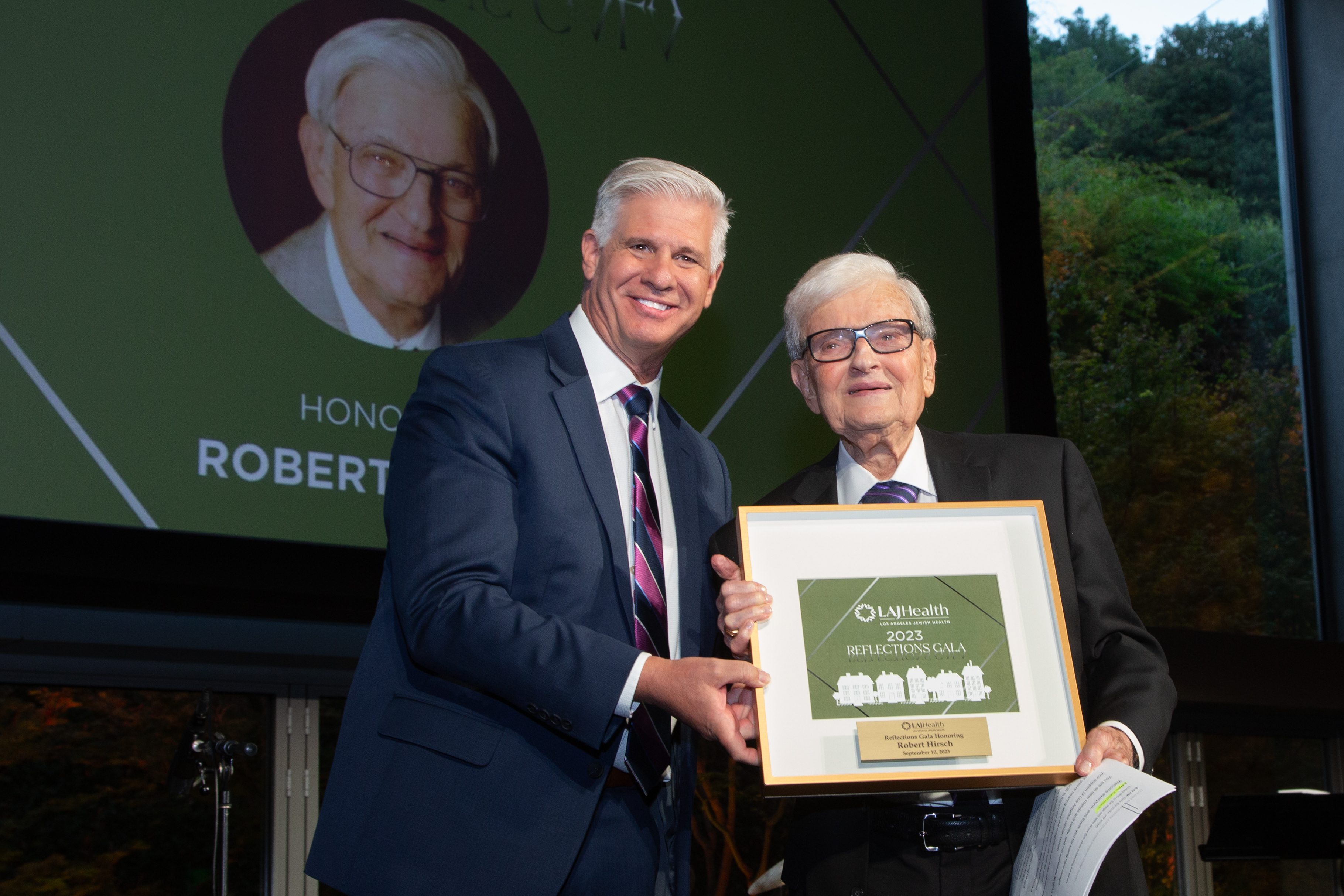
Los Angeles Jewish Health Offers Heartfelt Tribute to Benefactor and Friend Robert Hirsch
Robert Hirsch accepts Reflections Award from CEO and President Dale Surowitz
Every day, Los Angeles Jewish Health is able to make a difference in seniors’ lives thanks to the dedication and hard work of its staff, volunteers, and lay leadership. In September, the organization honored the contributions of stand-out volunteer leader, real estate developer and philanthropist Robert (Bob) Hirsch.
Bob was celebrated by a crowd of more than 300 (including many members of his loving family), who gathered together at Los Angeles Jewish Health’s annual Reflections Gala, held at the Skirball Cultural Center. With noted real estate agent and television personality Josh Flagg serving as master of ceremonies, the gala paid tribute to Bob’s influential career at the forefront of Los Angeles real estate development. His accomplishments include more than 150 projects in residential, multi-family, government-subsidized apartments, and quality assisted living and retirement facilities.
Bob’s influence on the Los Angeles real estate landscape is mirrored by his impact in the world of philanthropy. At Los Angeles Jewish Health, he has given of himself tirelessly, taking on critical roles as both member and chair of the LAJH board of directors and its board of governors. He has also been a member of the board of the Annenberg School of Nursing, which is located on property donated by the Hirsch family, adjacent to the LAJH campus on Tampa Avenue in Reseda.
During the gala’s dinner program, Los Angeles Jewish Health CEO and President Dale Surowitz shared exciting news about a redevelopment of the Hirsch Family Campus. Plans are underway to expand housing and care options for the growing population of low and middle-income seniors across Los Angeles in need of affordable housing options. Once complete, seniors residing on this campus will also have access to the successful adult day care program provided by the Brandman Centers for Senior Care PACE program.
“We are tremendously grateful to Bob for his dedication and vision, and we are delighted to honor his landmark achievements,” Surowitz said. “With his longstanding commitment to our community’s seniors, he has built an enduring legacy that has improved, and will continue to enrich, so many people’s lives. When completed, the Hirsch Family Campus will be an enduring symbol of Bob and his family’s generosity and support.”
The Gala raised over $625,000 to strengthen Los Angeles Jewish Health’s efforts to set new standards of excellence in senior care and, specifically, to advance its work on behalf of making the new Hirsch Family Campus housing program a reality.
For more photos of the Reflections Gala click here
The Hirsch Family
Event hosts Susan Hirsch-Wohl and Josh Flagg
Gala Attendees
Reflections Gala Media Gallery